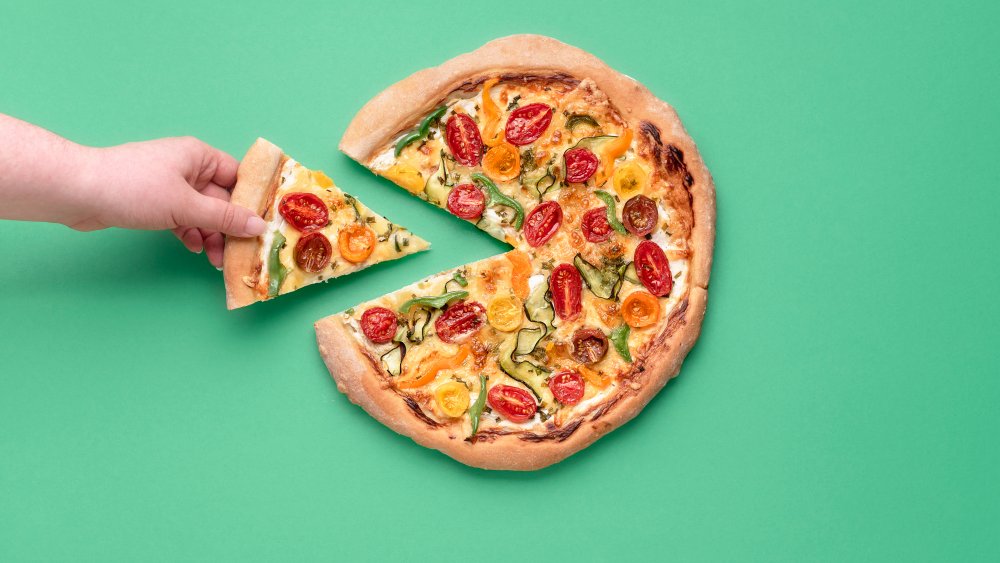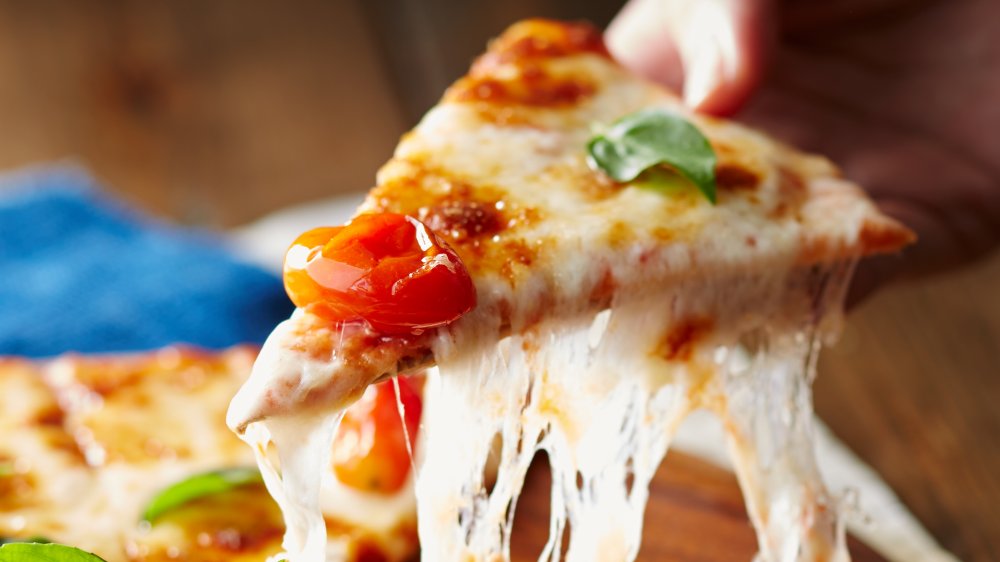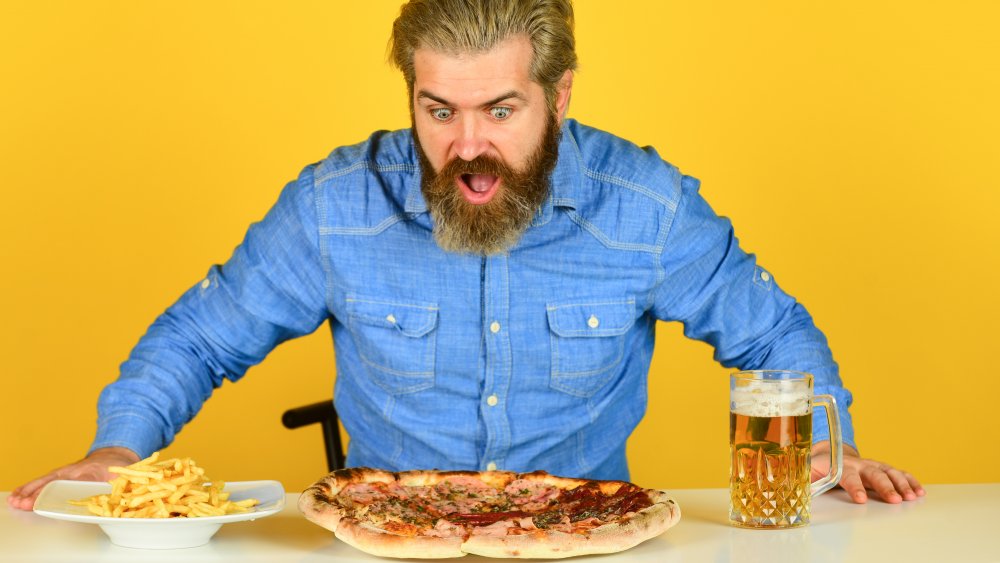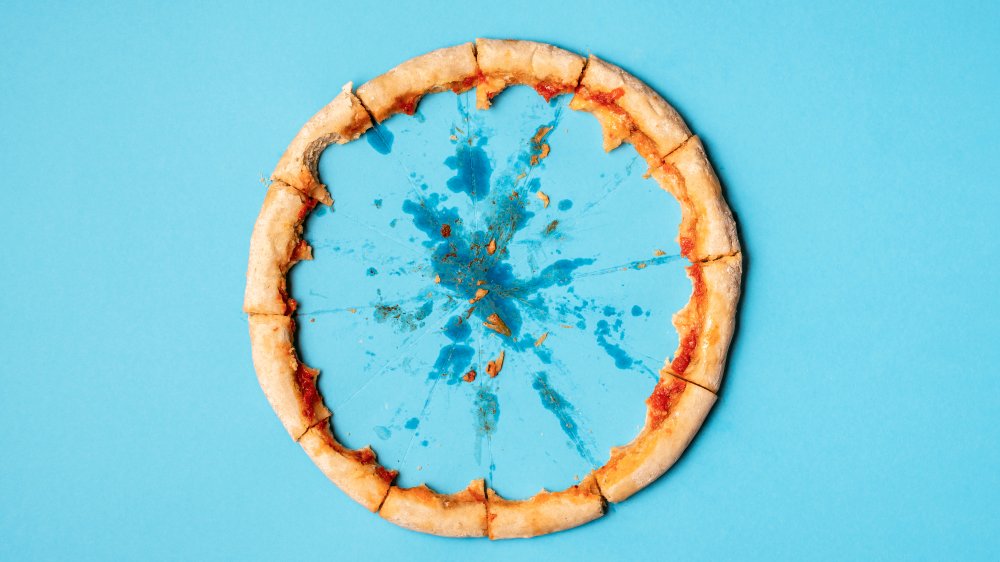When You Eat Pizza Every Day, This Is What Happens To Your Body
Pizza, as many people will admit, can be the ultimate comfort food, especially when washed down with soda and a side of garlic bread. It's also a fairly versatile option and can be eaten on several occasions: a house party with a close bunch of friends, on a game night with beer, at a noisy bar with tiny tables and no room for plates. And yet, from a health perspective, pizza is simply bad for your health, especially when consumed in great amounts. Eating pizza every day may sound like a fun idea, but in fact it's harmful. As Eat This, Not That! explains, one slice of pizza has 20 percent of the recommended daily amount of saturated fat. And that's just one slice. According to EatThisMuch, one medium slice of hand-tossed cheese pizza has 230 calories, 29 grams of carbohydrates, and 8 grams of fat — 4 of them saturated fat. For perspective, consider this: The American Heart Association advises people to limit their saturated fat intake to to 5-6 percent of their total calories every day. Too much saturated fat consumption puts you at risk of heart disease.
Scarfing down pizza every day can pile on the pounds thanks to the excessive number of calories you'll be taking in, especially considering your actual nutritional requirements. Dietician Jemma O'Hanlon told The Huffington Post that weight gain occurs due to an imbalance between the calories consumed and calories burned through physical activity.
You'll be exposing yourself to several problems
"Weight gain simply happens when we have an imbalance between the kilojoules we're eating and the kilojoules we're burning off," she explained. "It doesn't occur just from one meal — it's when this imbalance occurs over a period of time that weight gain can creep up on us." Including pizza every single day.
Certain ingredients in pizza, such as processed meat like bacon and pepperoni, can expose you to some types of cancer, as explained by The Guardian. Additionally, it's hard to meet your daily nutritional requirements, especially for fiber, by sticking to a food item like pizza that's made from refined flour. A dietary fiber deficit can lead to temporary and long-term health problems, including a weak digestive system, colon cancer, constipation and more (via Insider). There is one positive thing worth mentioning here, though. Pizza can provide you with lycopene, a chemical that is usually found in tomatoes and is linked to lowering risks of developing prostate cancer (via Medline Plus).
Despite the side-effects, adventurous folks have tried to sustain a pizza-only diet for years. Consider Dan Janssen, a man who gained fame in 2014 for surviving solely on a diet of pizza for 25 years. He told "Today" that he simply disliked vegetables.
Others have tried to walk down this path
"I hate vegetables,” he said. "I tried for maybe a couple weeks, and then I realized the thing I really like is pizza, so I'm going to eat that." He also acknowledged that his behavior wasn't ordinary and that doctors had given him the green signal in terms of his health — until that point. "I understand that this is a disgusting diet,” he said. "You expect me to be overweight and have no energy, high blood pressure, and high cholesterol. ... I'm sure when I'm 60 I'll drop dead of a heart attack, but right now I am fine."
A nutritionist explained why this diet is neither sustainable nor safe. "Eating the same food day in and day out can limit a person's ability to get a vast array of foods and nutrients he or she needs to optimize health and meet daily nutritional needs,” she said. "While pizza tastes great and certainly has its virtues, subsisting on it and having little else in the diet is a recipe for an unhealthy, nutritionally-inadequate diet." When Vice got in touch with Jannsen months later, he'd managed to include smoothies to his diet in a bid to tweak his eating habits.
The key to mastering this is moderation
So what's the best and safest way to consume pizza? The key is moderation. There's no harm in indulging yourself once in awhile, but an everyday habit will definitely throw your health off-balance. Ruben Bravo from the European Medical Institute of Obesity told the BBC that pizza isn't the culprit in and of itself; it's the over-consumption that causes problems. "The problem is not the pizza, it's pizza abuse. It is a highly calorific food ...we are talking about refined flours with fat that aren't good for health," he said.
Bravo advised people to make their own pizzas at home once a week, utilizing healthier ingredients. This would help avoid the overall intake of junk food and its harmful effects. That said, if you'd rather order in a box of pepperoni pizza, it's fine to do so, as long as you don't make it a regular habit. According to Time, its best simply to limit portion sizes of thin-crust versions, with healthier toppings like vegetables and less cheese. The final piece of advice stays the same: Opt for homemade whole-grain versions if you find it tricky to regulate your pizza slices.



